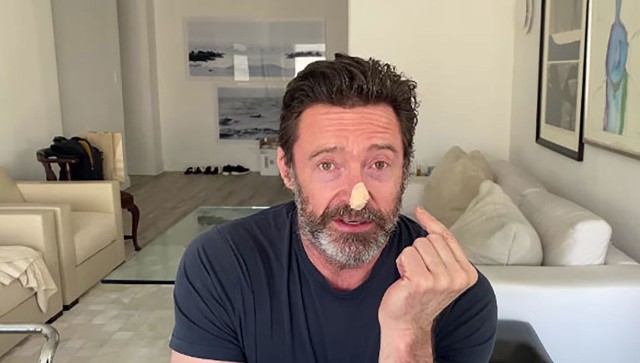The arrival of summer brings with it worries about skin cancer, wrinkles, peeling, and other sun-related problems. These sun phobias can be treated by either avoiding the sun altogether or applying sunscreen generously. Recently, Hugh Jackman also urged his fans and followers to slather on sunscreen this summer after sharing that he has been undergoing fresh tests for skin cancer as a result of a recent medical exam. But do sunscreens really prevent skin cancer? Let’s find out. Hugh Jackman reveals new skin cancer scare In his video post on Twitter, the Australian actor best known for playing Wolverine, said, “I wanted you to hear it from me, just in case someone sees me on the street or whatever. I’ve just had two biopsies done.” His doctor had noticed “little things that could be, or could not be, basal cell carcinomas.” The 54-year-old actor said, “Just to remind you, basal cells in the world of skin cancers are the least dangerous of them all.” He further assured his followers that basal cells are typically simple to treat, however, also recommended them to use protection from the sun. “However, if I may just take this opportunity to remind you, summer is coming. For those of us here in the Northern Hemisphere, please wear sunscreen. It is just not worth it. No matter how much you want a tan, Trust me,” he said, adding that he expects test results within the next few days.
You’ve heard me talk about my basal cell carcinomas before. And I’m going to keep talking about them, if need be. If just one person remembers to put on sunscreen with a high SPF, I’m happy. pic.twitter.com/J1srAzWQt0
— Hugh Jackman (@RealHughJackman) April 3, 2023
What is basal cell carcinoma? Basal cell carcinoma (BCC) typically appears as a tiny, bright pink or pearly-white lump with a transparent or waxy appearance, according to the UK’s National Health Service (NHS). It may also resemble a scaly, red patch. The lump gradually increases in size and could crust over, bleed, or turn into an ulcer without any discomfort. According to Mayo Clinic, signs of basal cell carcinoma can appear on the head, face and neck. As per the Skin Cancer Foundation, cancer rarely spreads beyond its initial site and is easily curable when discovered early. Also read: Explained: Can gel manicures cause skin cancer? What causes skin cancer? According to the American news website Vox, UVA and UVB are the two primary lights that can damage your skin and induce cancerous cell mutations. Your skin is burned by UVB rays, increasing your risk of developing cancer. Wrinkles and sun spots develop as a result of UVA’s deeper skin damage, which causes the skin to lose its elasticity. Before, UVA light was thought to mostly cause cosmetic damage, but we now know it is also associated with cancer. How sunscreen protects us from skin cancer? According to Skin Cancer Foundation, when used as directed, sunscreen can decrease the risk of skin cancers and skin precancers. It can also help prevent premature skin ageing which is caused by the sun, including wrinkles, sagging and age spots. The sun protection factor is referred to as SPF. It determines how well your skin is guarded against sunburn. Yet it is not a cancer prevention measure. SPF does not indicate UVA light protection; it just evaluates how well lotion shields you from UVB rays, reported Vox. Because of this, dermatologists advise checking for the term “broad spectrum,” which denotes the inclusion of both UVA and UVB protection. According to Environmental Protection Agency, It is important to know that an SPF of 30 does not provide double the protection of an SPF of 15; rather, when applied properly, an SPF of 15 shields the skin from 93 per cent of UVB radiation, while an SPF 30 sunscreen offers 97 per cent protection. The Canadian Dermatology Association also recommends the use of an adequate dose of a ‘broad-spectrum’ sunscreen with a sun protection factor of at least 30 for most children and adults. According to Dr Jaishree Sharad, there is no proof that the chemicals in sunscreen are harmful or dangerous to human health. She says these guidelines are supported by current FDA regulations as well as scientific research that demonstrates sunscreen is an efficient strategy to lower the risk of skin cancer. Contradictory studies Although it is conceivable that sunscreen protects skin cancer, the strong proof is difficult to find. According to review research that was published in the Journal of the American Academy of Dermatology, sunscreen is a multibillion-dollar industry, and its effectiveness in preventing skin cancer is frequently believed to be true. Despite this, there are only four prospective studies that look at the effectiveness of sunscreen in preventing skin cancer, and none of them looks at how well it works in preventing skin cancer in people who are otherwise healthy, reported Undark magazine. Robert Califf, a former FDA commissioner, and Kanade Shinkai, the journal’s editor-in-chief, asserted in an editorial that the cultural certainty we have about sunscreen is unjustified. They wrote that despite decades of widespread use, “(S)unscreens have not undergone standard drug safety testing. Users reasonably presume that companies that manufacture and sell sunscreens have conducted basic studies to support the safety and effectiveness of their products and that the medical profession would demand high-quality evidence.” The consequences on young children and newborns, who may absorb toxins more quickly, are an “urgent question.” The amount that people breathe in or absorb through the numerous personal care items that now incorporate UV filters is another issue, the authors of the editorial said. With inputs from agencies Read all the Latest News , Trending News , Cricket News , Bollywood News , India News and Entertainment News here. Follow us on Facebook, Twitter and Instagram.


)

)
)
)
)
)
)
)
)



